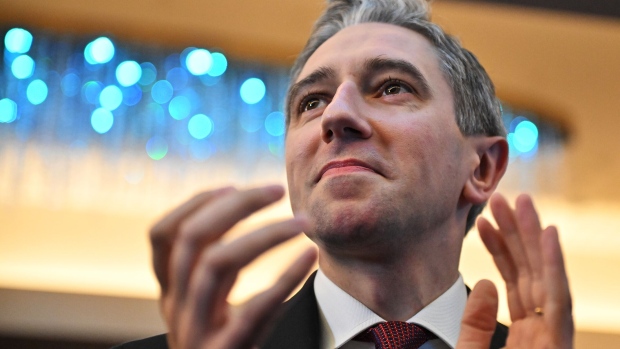Apr 9, 2024
Irish Parliament Votes to Appoint Simon Harris Prime Minister
, Bloomberg News

(Bloomberg) -- Irish lawmakers voted Simon Harris to be the next prime minister three weeks after Leo Varadkar unexpectedly resigned. At 37, he’ll be Ireland’s youngest premier.
Harris’s most immediate concern will be stemming an outflow of support for his centrist party just two months ahead of European Parliament elections and a national ballot expected within a year. Support for his Fine Gael party has dropped to 21%, five points behind the left-wing Sinn Fein, which leads polls, according to a Sunday Independent/Ireland Thinks opinion poll.
Harris received backing from his coalition partners — Fianna Fail and the Greens — while opposition parties have called for a new election. Harris has said he plans to take his government to full term, with a new ballot required by March 2025.
Two of the biggest challenges facing Ireland are migration and a housing crisis, with the government having committed to build 250,000 new homes by 2030. That has been coupled with a migration influx into the country.
House and rental prices have continued to rise and a property survey last month reported that the number of homes available to buy is down 24% year-over-year and nationwide stands at an all-time low.
Ireland has also been facing an accommodation crisis for asylum seekers arriving in the country, with 1,600 homeless. There have been protests and arson attacks on accommodations earmarked or rumored to be earmarked to asylum seekers.
Harris has been tacking to the right of the political spectrum, as independent parties and Sinn Fein have gained in popularity. Sinn Fein could be on track to form a government after the next election, though it would likely need a coalition partner to do so.
Sinn Fein was part of the struggle for independence from the British in what is now the Republic, and in Northern Ireland, it had links with the Irish Republican Army during the sectarian violence known as The Troubles.
The Sunday Independent/Ireland Thinks opinion poll was carried out on a sample of 1,334 people on April 5-6 and had a 2.7% margin of error.
©2024 Bloomberg L.P.







